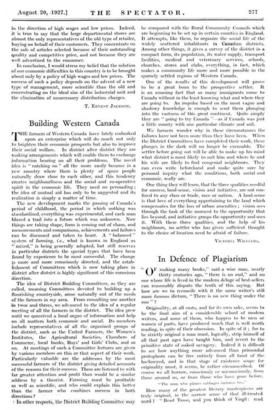Building Western Canada
rilHE farmers of Western Canada have lately embarked upon an enterprise which will do much not only to. brighten their economic prospects but also to improve their social welfare. In district after district they are making 'arrangements which will enable them to exchange information bearing on all their problems. The novel idea is " catching on." all the more easily because in a new country where there is plenty of space people naturally draw close to each other, and this tendency creates neighbourliness and the social and co-operative spirit in the economic life. They need no persuading ; the idea of mutual aid has only to be suggested and its realization is simply a matter of time.
The new development marks the passing of Canada's period of childhood, the period in which nothing was standardized, everything was experimental, and each man blazed a trail into a future which was unknown. Now things are taking shape, form is coming out of chaos, and measurements and comparisons, achievements and failures can be discussed and taken to heart. A " balanced " system of farming, i.e., what is known in England as mixed," is being generally adopted, but still reserves in particular districts the special types that have been found by experience to be most successful. The change is more and more consciously directed, and the estab- lishment of Committees which is now taking place in district after district is highly significant of this conscious direction.
The idea of District Building Committees, as they are called, meaning Committees devoted to building up a flourishing countryside, arose naturally out of the needs of the farmers in my area. From consulting one another in twos and threes, we advanced to the idea of a regular meeting of all the farmers in the district. The idea grew until we conceived a local organ of information and help on all matters both economic and social. Its members include representatives of all the organized groups of the district, such as the United Farmers, the Women's Institutes, the Agricultural Societies, Chambers of Commerce, local banks, Boys' and Girls' Clubs, and so on. At meetings of such a Committee lectures are given by various members on this or that aspect of their work. Particularly valuable are the addresses by the most successful farmers of the district giving detailed accounts of the reasons for their success. These are listened to with far greater attention and profit than would be a similar address by n theorist. Farming must be profitable as well as scientific, and who could explain this better than the farMer ivho combines success in both directions ? - In other respeeti, 'the Diitriet Building. Committee may be compared with the Rural Community Councils which are beginning to be set up in certain counties in England. It attempts, like them, to organize the social life of the widely scattered inhabitants in Canadian districts. Among other things, it gives a survey of the district in a compact form, its population, its water supply, transport facilities, medical and veterinary services, . schools, churches, stores and clubs, everything, in fact, .which makes a community life more and more possible in the sparsely settled regions of Western Canada.
- One of the results of this development will prove to be a great boon to the prospective settler. It is an amazing fact that so many immigrants come to Canada without in the least knowing what and where they are going to. An impulse based on the most vague and shadowy knowledge is enough to send them plunging into the vastness of this great continent. Quite simply they are " going- to try Canada "—as if Canada was just a little county with one particular climate and soil.
We farmers wonder why in these circumstances the failures have not been more than they have been. When the District Committees have completed their work, these plunges in the dark will no longer be excusable. The settler before going out will be able to make up his mind what district is most likely to suit him and where he and his wife are likely to find congenial neighbours. They can even write beforehand and make quite sure by personal inquiry what the conditions, both social and economic, really are.
One thing they will learn, that the three qualities needful for success, land-sense, vision and initiative, are not con- fined to any class or trade, race or nation. A land-sense is that love of everything appertaining to the land which compensates for the loss of urban amenities ; vision sees through the task of the moment to the opportunity that lies beyond, and initiative grasps the opportunity and uses it. With these three qualities, and the help of his neighbours, no settler who has given sufficient thought to the choice of location need be afraid of failure.


































 Previous page
Previous page